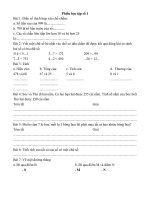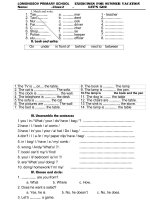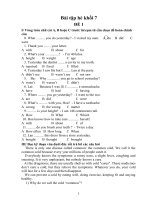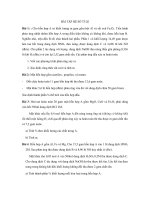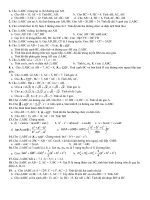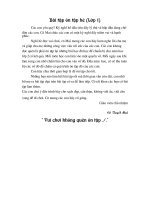Bai Tap He 2012 1
Bạn đang xem bản rút gọn của tài liệu. Xem và tải ngay bản đầy đủ của tài liệu tại đây (4.72 MB, 5 trang )
<span class='text_page_counter'>(1)</span><div class='page_container' data-page=1>
1
<b>SUMMER COURSE 2012 </b>
<b>MODALS </b>
<i><b>Complete each sentence by choosing the correct modal verb. </b></i>
(1)
You (would / might / must) like to accompany me for the day. If you wanted to get your ticket, (couldn’t /
mustn’t / wouldn’t) you go to the station first? Our guests (may / would / could) wish to order breakfast in bed.
You (could / must / would) have told me you’d be late — I’ve been waiting! His mother (will / shall / would)
be pleased when she hears about the party. As a senior, you (can / will / would) use the library at the weekends.
There (would / may / shall) be some problems that we haven’t thought about. I’ll be on my mobile, if anyone
(would / should / could) need me. Don’t expect him to bring anything — he (won’t / don’t / doesn’t) have had
time to shop. Peter — you (couldn’t / shouldn’t / mightn’t) speak to your father like that!
(2)
I (couldn’t / ought not to / wouldn’t) bother spending much time on it if I were you. You (can’t / won’t /
mustn’t) worry so much — it’ll be ok. He’s not usually late — he (might / would / should) have had some
work to finish. He (might / must / will) be very charming but I don’t like him. (Would / Shall / Must) we see
you at the party next week? You’ve been feeling ill for ages — you (would / should / will) go to the doctor. I
was out shopping during lesson time when who (will / may / should) I see but my teacher! I (might / would /
can) think he needs to speak to the boss first. He (may / ought to / shall) arrive late because of the traffic.
During her childhood holidays, she (should / may / would) play on the beach for hours.
(3)
The woman asked if she (would / might / may) wait in his office. (Should / Shall / Might) I borrow your pen
for a moment? If you hadn’t given me a lift, I (might be / would’ve been / will’ve been) late. Children under 18
(might / may / could) not enter the bar. (May / Will / Shall) you give that to Mr Davies when you see him? I
can’t see him — he (may / would / can) have left already. There (ought not to / could not / must not) be a
problem if you want to transfer your flights. She (could / can / ought to) ride a bike when she was three!
They’ve spent hours practising the play — it (should / would / can) be good. She’s got the time and money —
why (mustn’t / shouldn’t / won’t) she go?
(4)
In the exam, just do the best you (ought to / might / can) . He’s late. She (can’t / won’t / mustn’t) have told him
the right time to meet. It would be a good idea if you (could / would / should) take a year off before you go to
university. Don’t worry. I know it’s confidential. I (couldn’t / shan’t / mustn’t) tell anyone. (Should / Can /
Must) you turn the music down? I’m working! You’re too lazy — you (must / may / might) do some more
work for your exam. We knew he (would / ought to / will) be angry if we didn’t finish the work. He annoys me
— he (will / must / can) insist on phoning at dinner time! I’m doing it now — I (can / must / will) have finished
by 6 this evening. I (could / must / would) prefer to stay in than go out tonight.
(5)
</div>
<span class='text_page_counter'>(2)</span><div class='page_container' data-page=2>
2
<b>VERBS IN THE PASSIVE VOICE </b>
<i><b>Complete each sentence using the correct form of the verb in CAPITALS. </b></i>
(1)
1. They had ... for the work already but they didn’t do it. (PAY)
2. Profits can ... in several different ways. (CALCULATE)
3. The product has ... with cancer in recent research. (LINK)
4. The chemical is now ... as a disinfectant in hospitals. (USE)
5. Initially his violence ... to stem from his unhappy childhood. (THINK)
6. The result would have ... too soon had it not been for Martin. (REVEAL)
7. Poor results have ... to a weak marketing campaign. (ATTRIBUTE)
8. You may ... by the doctor tomorrow but I can’t guarantee it. (SEE)
9. Every September the cup is ... back to the village. (BRING)
10. The results are currently ... (ANALYSE)
(2)
1. Nobody else is ... in connection with the incident. (SEEK)
2. The Chairman has ... to severe criticism for his policy. (SUBJECT)
3. The new team will ... from those currently involved in sales. (DRAW)
4. The play is ... on his successful book. (BASE)
5. The actor is ... to have recovered quickly from the fall. (REPORT)
6. His anger has ... as a sign of his guilt. (INTERPRET)
7. The President is ... to be very disturbed by the news. (UNDERSTAND)
8. At the ceremony next month, Britain ... by the Chancellor. (REPRESENT)
9. Iron is ... as a metal. (CLASSIFY)
10. The effects are ... with increased blood pressure. (ASSOCIATE)
(3)
1. The success of the campaign is ... by sales generated. (MEASURE)
2. The film was ... in several arts cinemas last year. (SHOW)
3. The proposals will ... over to the next meeting. (CARRY)
4. When he was arrested, he had ... in crime for years. (INVOLVE)
5. The facts have yet to ... by the police. (DETERMINE)
6. The driver was ... for six months. (JAIL)
7. The decision announced yesterday had ... since July. (EXPECT)
8. As you enter the gallery, the statue is to ... on the left. (FIND)
9. Now the government is slowly ... to admit its mistakes. (FORCE)
10. The president is ... to visit at the end of next week. (SET)
(4)
</div>
<span class='text_page_counter'>(3)</span><div class='page_container' data-page=3>
3
<b>VERB PATTERNS </b>
<i><b>Choose the correct word or phrase to complete each sentence. </b></i>
1. She misses (to be / being) in Paris.
2. He accepted (that / how) the plan would have to change.
3. I managed (to find / finding) the books I wanted.
4. She was sitting by the fire (reading / to read).
5. He (smiled her story / smiled at her story).
6. David volunteered (cooking / to cook) the dinner.
7. He was trying to describe (what / that) she looked like.
8. You can choose (which / that) of these cakes you want.
9. We (test / test on) children at the ages of 7 and 11.
10. I don’t know how to (pronounce / pronounce about) this word.
11. Caroline regretted (that / which) she could not reply in English.
12. Water splashed (on my clothes / to my clothes).
13. Too much salt will spoil (the meal / meal).
14. He (supported / supported up) the idea of changing the rules.
15. She tricked them (to believe / into believing) that she was a princess.
16. He inquired politely (why / that) there was no coffee.
17. The aircraft (rose above / rose) the clouds.
18. Protesters are demanding (that / which) the hospital should stay open.
19. He is learning (to drive / driving).
20. I cannot tolerate people (being rude / to be rude).
21. He persuaded Colin (to lend / lending) him some money.
22. Andy introduced (himself to / to himself) his neighbour.
23. He argued (that / how) it was too soon to decide.
24. She couldn’t forgive her for (to make / making) that stupid comment.
25. She’s just qualified (to be teacher / as a teacher).
26. It depends (how careful I am / that I am careful).
27. He (lacks / lacks in) judgment.
28. She reported (how / that) the restaurant would be open in half an hour.
29. It’s hard to judge (that / whether) we should go or not.
30. The liquid began to spread (across the floor / the floor).
31. Jill complained (why / that) the food tasted odd.
32. Kate hurried (to catch up with / catching up with) Ray.
33. Stephen promised (that / what) he would find out who was responsible.
34. He hummed (himself / to himself) as he chopped the vegetables.
35. Tears (sparkled in her eyes / sparkled her eyes).
36. She commented (that / what) it was time he had a nap.
37. She insists (how / that) the situation has not changed.
38. He imagined (to be / being) a famous pop star.
39. He assured me (that / what) it was safe.
40. She didn’t want to (risk / risk at) getting ill.
41. I will have to apologize (to her / her).
42. I hope (that they do well at school / how well they do at school).
43. She was debating (that / whether) to invite Jeremy for lunch.
44. He insisted (on being / to be) paid before he started work.
45. Police estimated (that / whether) there were about two thousand people there.
46. Do you object to (to me being / to me to be) here?
47. I have applied (a new job / for a new job).
48. The list (included / included in) three people called Smith.
49. They supplied (us with / to us) all the food we needed.
</div>
<span class='text_page_counter'>(4)</span><div class='page_container' data-page=4>
4
<b>VERBS MEANING ‘PERFORM’ </b>
<i><b>Complete each sentence by choosing the form of the verb that collocates with the word in CAPITALS. </b></i>
(1)
1. (Gives / Gave / Give / Giving / Given / Given) your granny a KISS and say goodnight.
2. Now you know all the facts, you can (making / makes / make / made) an informed CHOICE.
3. This invention has (makes / made / making / make) a major CONTRIBUTION to road safety.
4. Just calm down, (take / took / taking / taken / takes) a SEAT, and describe what happened.
5. If you don’t (pay / paid / paying / pays) ATTENTION now, you’ll get it all wrong later.
6. She (makes / make / making / made) some very helpful SUGGESTIONS but her boss rejected them all.
7. Soon after we joined the motorway, the car started to (made / makes / make / making) a strange NOISE.
8. Don’t (makes / made / make / making) a SOUND and stay absolutely still.
9. We must (took / taking / take / taken / takes) ACTION to deal with the problem before it spreads to other
areas.
10. He (taken / takes / take / taking / took) a WALK around the block, to clear his head.
(2)
1. The Brighton FESTIVAL is (holds / hold / held / holding) every year around May time.
2. He (giving / gave / give / given / gives) HIS WORD that he would marry her and she had no cause to doubt
him.
3. Why don’t you (given / given / give / gave / giving / gives) her a CALL, or better still go and see her in
person?
4. If we could all (make / made / makes / making) an EFFORT to keep this office tidier it would help.
5. I think I’ll (paying / paid / pays / pay) a VISIT to the hairdresser’s while I’m in town.
6. I’ve just got a couple of PHONE CALLS to (make / made / makes / making).
7. Would you believe he still takes all his WASHING home for his mother to (doing / does / done / did / do)! 8.
Friends and relatives came to (pay / pays / paying / paid) their last RESPECTS to Mr Cohen.
9. Have you (did / does / do / done / doing) THE DISHES?
10. We (took / taken / taking / take / takes) a PICTURE of the children on their new bicycles.
(3)
1. When this project is finally finished I’m going to (taken / taking / takes / took / take) a good long
2. HOLIDAY. She (give / giving / gives / given / gave) her father a big SMILE and told him not to worry.
3. She (makes / making / make / made) such A GOOD IMPRESSION at work that she was soon promoted.
4. Come here and (given / giving / given / gives / give / gave) me a big HUG.
5. Italy’s leading bass was to (gives / give / given / gave / giving / given) a CONCERT in the park.
6. They’d (made / make / making / makes) all the ARRANGEMENTS for a huge party.
7. When he (given / gave / give / giving / gives) the ORDER, the candidates opened their exam papers and
started to write.
8. I (having / has / have / had) a stand-up FIGHT with her about the telephone bill.
9. You (did / done / do / does / doing) THE WASHING-UP and I’ll do the drying.
10. The CONFERENCE used to be (held / holding / holds / hold) annually but now it takes place every other
year.
(4)
1. I thought I’d (pay / paying / pays / paid) a CALL on an old friend of mine this weekend.
2. She (make / making / made / makes) a few half-hearted ATTEMPTS to join in their conversation.
3. I thought we might hire a motorboat this afternoon and (take / taking / took / takes / taken) a TRIP around
the bay.
4. After the prisoner had (made / make / making / makes) his STATEMENT the police officer asked him to
sign it.
</div>
<span class='text_page_counter'>(5)</span><div class='page_container' data-page=5>
5
6. Why don’t you give me a call and we’ll (having / has / have / has) a CHAT?
7. She’s always complaining that her husband never (paid / pays / paying / pay) her any COMPLIMENTS.
8. Could you (do / did / doing / done / does) me a FAVOUR – would you lend me your pink dress for the
party?
9. We (make / made / making / makes) repeated REQUESTS for help with our debts to our bank.
10. The house was almost perfect when we moved in so we didn’t need to (makes / making / make / made)
many CHANGES to it.
(5)
1. The minister argued in favour of (making / made / makes / make) CUTS in military spending.
2. Even a small donation can (doing / do / done / does / did) a lot of GOOD.
3. It was obvious that she had (does / done / doing / did / do) her HOMEWORK and thoroughly researched the
backgrounds of her interviewees.
4. I must (did / done / does / do / doing) THE IRONING tonight.
5. Marrying Pat was the biggest MISTAKE I ever (made / make / makes / making).
6. He admitted that he’d (make / makes / making / made) an ERROR.
7. Who (do / doing / does / done / did) THE COOKING in your house?
8. The doctor told me to (taken / took / taking / takes / take) A DEEP BREATH and hold it.
9. Recent discoveries about corruption have (doing / did / does / do / done) serious DAMAGE to the
company’s reputation.
10. You don’t get anywhere in life without (takes / taking / taken / take / took) CHANCES.
(6)
1. Could you (give / gave / given / giving / gives / given) me A HAND with the piano, please?
2. We must (makes / making / made / make) PLANS for next year.
3. The children (has / have / having / had) an ARGUMENT about what game to play.
4. Is it more truly democratic to (holding / hold / holds) a REFERENDUM, rather than let the government
alone decide an important issue?
5. It’s your turn to (done / doing / did / does / do) THE CLEANING.
6. They were delighted when she (given / gave / gives / giving / give) BIRTH to a healthy child.
7. We have some difficult DECISIONS to (making / makes / made / make).
8. I have an APOLOGY to (made / make / makes / making) to you – I’m afraid I opened your letter by mistake.
9. He (giving / give / gave / gives / given) a TALK about his visit to America.
10. People who speculate have to be prepared to (take / taken / takes / took / taking) the RISK of losing money.
(7)
1. The charity can also (makes / make / making / made) a one-off PAYMENT for special cases.
2. The asking price for the flat was £44 500, so Sally (making / makes / made / make) an initial OFFER of £40
000 for it.
3. Sandra (had / having / have / has) a BABY on May 29th.
4. I (had / having / has / have) an interesting CONVERSATION with the bloke who lives in the flat below us
this morning.
5. They can’t dismiss you just like that – they have to (give / given / gives / gave / given / giving) you a written
WARNING first.
6. Would you rather (having / have / has / has) fresh COFFEE or instant?
7. They (given / giving / gave / give / gives) a superb PERFORMANCE of Arthur Miller’s play ‘The Crucible’.
8. We were trying to (hold / holds / holding) a CONVERSATION but with all this noise going on it was
impossible!
9. Our firm (do / done / doing / did / does) a lot of BUSINESS with overseas customers.
10. My parents (taking / took / take / taken / takes) a lot of PHOTOGRAPHS of us when we were small.
<b>Click here! </b>
<b>Cấn Chính Trường </b>
</div>
<!--links-->
